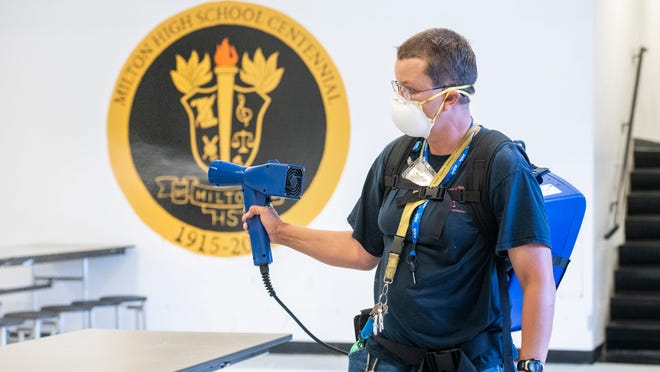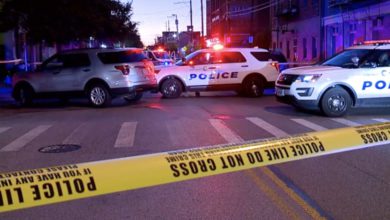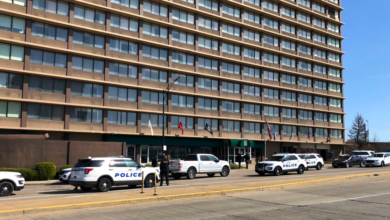
Kids accounted for more than one-fifth of total COVID-19 cases in the U.S. for week ending Aug. 26, according to data from the American Academy of Pediatrics and the Children’s Hospital Association.
Last week, children made up 22.4% of the reported cases. That’s higher than the overall total average of child cases during the pandemic, which is 14.8% of total cumulative cases. The report also noted there was a 9% increase in the cumulative number of child cases from Aug. 12 to Aug. 26.
The increase comes as children have begun in-person schooling for the first time since the pandemic began in many cases. The ages that states consider to be a “child” case vary, but children under 12 are currently ineligible for COVID-19 vaccines.
In Iowa, for example, 22% of Iowa's 8,308 COVID-19 cases are reported in children, according to state data released this week.
Dr. Rochelle Walensky, director of the Centers for Disease Control and Prevention, said Thursday that new studies to be released Friday show hospitalizations in kids were four times higher in states with low vaccination rates in the month of August.
“Cases, emergency room visits and hospitalizations are much lower among children and communities with higher vaccination rates. Vaccination works," Walensky said.
COVID-related hospitalization and death among children is still rare, but more data is needed to determine long-term impacts on children, the American Academy of Pediatrics noted.
Also in the news:
►The United States is once again reporting more than 10,000 COVID-19 deaths each week, a USA TODAY analysis of Johns Hopkins University data shows. The country reported 10,105 deaths in the week ending Thursday, passing a mark not seen since early March. Less than two months ago, the U.S. had been reporting 1,525 deaths per week, accounting for a 562% increase.
►As part of a new vaccine swap, Britain will send 4 million doses of Pfizer's vaccine to Australia with the agreement that Australia will return the same number to the United Kingdom later this year. The agreement will "enable the UK better align timings of our own supply of vaccines with our future need" while helping Australia with immediate vaccine supplies for a domestic campaign.
►The European Union and AstraZeneca settled a lawsuit Friday over the slow pace of COVID-19 vaccine deliveries with the drugmaker committing to deliver 300 million doses by next March, as was agreed in an advance purchasing agreement both parties signed a year ago. AstraZeneca's vaccine is not yet available in the U.S.
►Alabama health officials have recruited 13 colleges, including the University of Alabama and Auburn University, to host COVID-19 vaccination campaigns ahead of football games this fall, with fans eligible for $75 voucher incentives on game days.
►Florida Gov. Ron DeSantis has appealed a judge’s ruling that the governor exceeded his authority by ordering school boards not to impose strict mask requirements on students to combat the spread of the coronavirus.
📈 Today's numbers: The U.S. has recorded more than 39 million confirmed COVID-19 cases and more than 643,000 deaths, according to Johns Hopkins University data. Global totals: More than 218 million cases and 4.5 million deaths. More than 174 million Americans — 52.7% of the population — have been fully vaccinated, according to the CDC.
📘 What we're reading: Denver has a strict vaccine mandate for teachers, plus masks. It's keeping kids in school. Here's how they're doing it.
Keep refreshing this page for the latest news. Want more? Sign up for USA TODAY's Coronavirus Watch newsletter to receive updates directly to your inbox and join our Facebook group.
Pandemic makes finding child care more overwhelming than ever before
For parents across the country, the process of finding and signing up for child care – and the government subsidies that help them afford it – has become more overwhelming than ever before. Quality early-learning options are in short supply across the country. Centers are understaffed, and case managers are overextended. Many families lack the time and savvy needed to land a seat at the programs that do exist.
First, there’s the hassle of figuring out what’s available: Reliable, go-to directories listing up-to-date openings are rare, as are clear ratings of a program's quality. Then there’s the time-consuming task of calling or visiting each of those providers to see where there are vacancies, filling out applications and, sometimes, going through interviews. Then the months- or even years-long waitlists. Preschool admissions can be cutthroat.
And for many low- and middle-income parents, there’s the added step of figuring out and applying for financial aid, which typically entails its own mishmash of procedures and paperwork.
“Given today’s technology, it should be as easy to find child care as it is to make a dinner reservation,” said Cara Sklar, the deputy director of early and elementary education policy at New America, a Washington, D.C., think tank. Instead, Lara said, “it feels like you’re submitting an application into outer space.” Read more here.
— Alia Wong, USA TODAY
'It's a law': Iowa governor declines to recommend masks for students
Iowa Gov. Kim Reynolds on Thursday declined to recommend whether students should wear masks in schools, saying the opinion "doesn't really matter" because state law bans local districts from making it a requirement.
Reynolds' response, which came during a news conference at the Iowa Capitol, was to a question on whether the Iowa public health director Kelly Garcia would recommend students wear masks at school despite the ban on mandates. The governor answered the question instead of Garcia.
"It is a law that elected officials that are elected by Iowans and constituents across this state listened to the people that they represent, passed a bill, sent it to my desk and it was signed into law," Reynolds said.
Following the news conference, Garcia told reporters she sends her own children to school wearing masks.
"As the governor answered, there is a law on the books in Iowa, but that doesn't mean a parent can't make their own decision," Garcia said. "As a parent, I send my children to school in masks every day and I've had that conversation with our health care provider and our teachers."
Like many Republican governors across the U.S., Reynolds has been resistant to mask requirements throughout the pandemic. Iowa's policies have diverged from Centers for Disease Control and Prevention guidance, which recommends universal masking in schools and that people wear masks in areas with high coronavirus transmission regardless of their vaccination status.
— Ian Richardson and Stephen Gruber-Miller, Des Moines Register
Pediatric ICUs 'under stress' as more kids get hospitalized for COVID, RSV
As hospitals continue to see a spike in hospitalizations among young children for COVID-19, another respiratory disease is simultaneously dominating pediatric intensive care units and overwhelming health care workers.
Respiratory syncytial virus, or RSV, is a common virus that usually causes mild, cold-like symptoms primarily in children, according to the Centers for Disease Control and Prevention. It’s the most common cause of pneumonia in children younger than 1 in the U.S.
A typical RSV season occurs in the final quarter of the calendar year, from October to December. But an unseasonable RSV surge came this summer, threatening hospital capacity in states grappling with high coronavirus transmission, as young children sick with COVID-19, RSV or both fill up ICU beds.
Health experts say they’re especially concerned about children who are infected with both COVID-19 and RSV. Versalovic said approximately 50% of children with co-infections have been hospitalized at Texas Children’s, mostly patients under 5. Read more here.
— Adrianna Rodriguez, USA TODAY
A shot in the dark: Millions of Americans keep vaccination secret
The stigma of actually believing in vaccines is so powerful in some communities that millions of Americans are getting inoculated in secret to avoid reproach -- even though the shots have been proved safe and effective.
About 1 in 6 who are vaccinated against COVID-19 say they're keeping that information a secret from at least some people, while more than 1 in 17 aren't telling anyone, according to a Harris Poll survey conducted exclusively for USA TODAY. With more than 174 million being fully vaccinated in this country, that adds up to upward of 10 million declining to share that information.
In many cases, vaccinated people hide it because they know others in their life wouldn't approve.
“I was very uncomfortable with the idea of letting the supervisor know that I was going out to get a COVID shot,” said William, a manufacturing worker in Maine whose boss spread vaccine misinformation. “It does feel quite hostile.”
— Nathan Bomey
Source link









